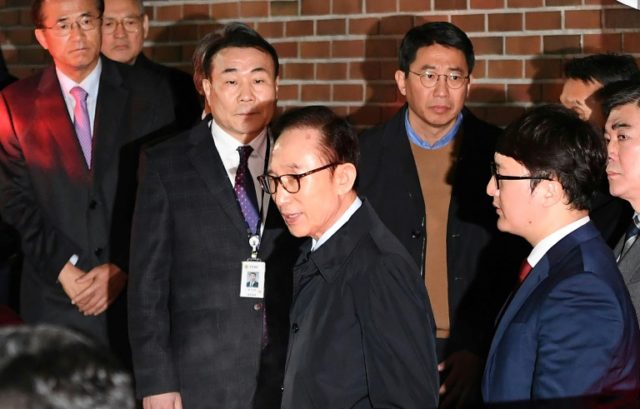Former South Korean president Lee Myung-bak, who held office from 2008 to 2013 and is now 77 years old, was arrested late Thursday night on corruption charges.
The allegations include bribery, embezzlement, abuse of power, breach of the public trust, illegally withholding presidential documents, tax evasion, and election law violations. The charges carry a combined sentence of up to 45 years in prison.
“Prosecutors escorted him from his grace-and-favor residence in Gangnam late Thursday night and transported him to a remand jail on the outskirts of Seoul,” Chosun Ilbo reported.
Lee has clearly been in serious jeopardy from the corruption investigation for some time, but his arrest occurred with surprising speed because prosecutors feared the “destruction of evidence.” Given that the charges against him include illegally retaining official documents, the authorities evidently felt it was important to take him into custody and secure whatever materials were still in his possession.
According to prosecutors, Lee accepted over $10 million in bribes from various sources, including a payoff from Samsung laundered through an American law firm, paid to assist an auto-parts company called DAS that is ostensibly owned by Lee’s older brother. Another charge against Lee accuses him of abusing government power to benefit DAS. A warehouse owned by the company is also said to be the repository for classified government documents that Lee should not possess.
Global electronics giant Samsung figures in a number of South Korean corruption cases, notably including the case against Park Geun-hye, Lee Myung-bak’s successor as president. The head of the Samsung Group, billionaire Jay Y. Lee, was convicted and sentenced to five years in prison on bribery charges in April 2017. Lee appealed the sentence, but it seems possible he could end up behind bars for even longer if prosecutors have their way.
In addition to being part of the seismic financial, cultural, and political calamity of the Samsung corruption case, Lee Myung-bak’s arrest is a demoralizing blow to conservatives in South Korea because he is portrayed as putting his own selfish interests above national security. In the most egregious example, Lee appears to have signed a secret deal with the United Arab Emirates that would actually oblige South Korean troops to fight on the UAE’s behalf. The quid pro quo was an $18.6 contract to construct a nuclear power plant in the UAE in 2009.
Another serious national-security allegation is that Lee diverted military cyber resources intended to protect against North Korean hackers and used them to manipulate public opinion in favor of Park Geun-hye during her ultimately successful bid to succeed him as president.
Lee has denied many of the charges against him, but not all. “Rather than blaming others, I feel that I am at fault for everything and I also feel a sense of guilt. I hope that my arrest will ease the pain suffered by those who worked with me as well as their families,” he wrote on Facebook after his arrest warrant was issued.
Lee’s office was considerably less humble and penitent; it released a statement rejecting all charges from the state prosecutors, vowed to “fight with full-fledged effort to get the truth out at court,” and said the former president’s arrest was part of “a state-led political scheme to kill Lee Myung-bak” that has been playing out “since the day the Moon Jae-in government assumed office.”
Lee himself has in the past speculated that current president Moon Jae-in is persecuting him in revenge for the death of an even earlier South Korean president, Roh Moo-hyun, who committed suicide in 2009 during a corruption investigation. Moon was President Roh’s chief of staff.
“Prosecutors are looking into whether to call in Lee’s wife, Kim Yoon-ok, for questioning about suspicions that she took close to 1 billion won in illicit money from the state intelligence agency and others,” Yonhap News adds.

COMMENTS
Please let us know if you're having issues with commenting.